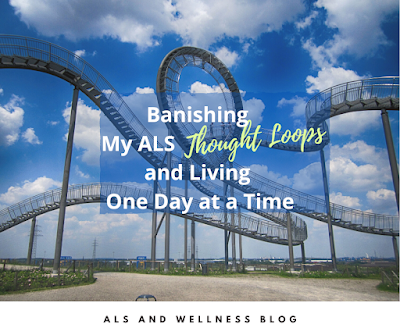
Whether they find me by way of my personal blog, my
writings for ALS News
Today, or through the social media channels for the ALS community - - ALS
patients find me! I always enjoy meeting and chatting online and learning a
little bit about each person. Many are newly diagnosed ALS patients. So, besides
wanting to learn as much as possible about ALS, they also tell me they are
worried about their progressing symptoms, their future, and their ability
to handle it all.
Often, they ask how I’ve been able to cope with my ALS for
the past 12 years, and I suggest they begin by avoiding getting caught up in
what I call “thought loops.”
What are thought loops?
It’s easy for anyone with a serious chronic illness, especially
one such as ALS, to fall into thought
loops. These include everything from imagining future worst-case scenarios, and reviewing past memories, to cycling through negative self-talk.
For example, early on one of my own thought loops was an
obsession with expiration dates.
When my doctor told me I had ALS, she also mentioned that
the average patient’s life expectancy was two to
five years. I left her office that day with the feeling that an invisible
expiration date had been stamped on my forehead. Suddenly, I fixated on
comparing my so-called expiration date with objects around our home. In the
bathroom, I even examined lotion bottles and medications in search of their
“use-by” dates.
To my despair, I discovered a bottle of eye drops that would
be around longer than me!
Certainly, this was not logical thinking, but then thought
loops rarely are logical.
How do I banish thought loops?
This first strategy is especially
helpful when my thought loops hit me in the middle of the night. Whenever
I notice my thoughts straying into a loop of anxious,
negative thinking, I literally yell in my brain, “Stop!
Focus on the NOW.”
Then I take a slow breath in and out and observe my
surroundings. I listen for sounds, feel the mattress under me, and even the
temperature of the air on my skin. It usually takes only a few seconds to get
my mind to
pay attention to the “here and now.” I’ll admit that
nighttime thought loops are hard to break out of. But every time I get sucked
back in, I repeat the steps above. It might take five or more tries, but
finally, my body relaxes and I fall asleep.
In the daytime, I’ll often use the same strategy. Moving
my body also works, and so does shifting to a new position or talking to
another person. For those who have a family pet, this is the perfect time for
play and hugs.
A change of perspective
Paying attention to the present moment, doing one thing at a
time, and living one day at a time is a powerful change of perspective.
I also reframe
my expectations for the day. Rather than focus on what I can’t do anymore,
I look at what I can do. My positive self-talk includes: “Today I can … and to
maintain it I will … I am challenged by … and my solution is …”
Join us in the forum to learn more
While I always enjoy answering individual emails from those
who are on my blog email list, I also enjoy the active discussions on a variety
of topics in the ALS News Today Forum.
I happen to be one of the moderators for the site. Our members are patients, family
members, and caregivers who share their tips and suggestions. I invite you to
join us because it’s a good way to meet others on a social-safe site and I look
forward to introducing you to our members.
Together we can help each other banish our ALS thought
loops. Together we can learn to live well while living with ALS.
---------------------------------
 |
| Dagmar Munn ALS and Wellness Blog |
"YOU CAN THINK BETTER, which means you can tune that inner voice of yours and ultimately live better because of it."
Marc & Angel Chernoff
Your insights are always so helpful and positive. I deal with nighttime thought loops by turning on BBC Radio and listening to BBC World News or an unexpected interview or report.
ReplyDeleteWhat is your thoughts on continuing to work full time after a bulbar diagnosis
ReplyDeleteThere are no hard and fast rules about working after being diagnosed with ALS. It depends on the type of work you do and your level of energy. This is something you should discuss with your doctor and the Human Recources folks of your employer. Best wishes to you for continued health.
Delete